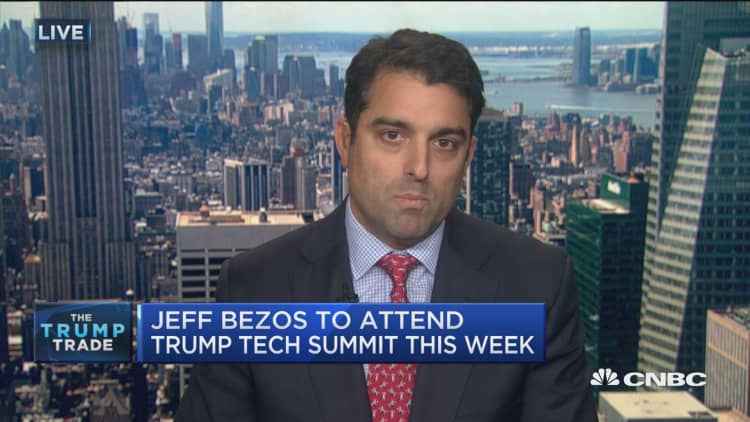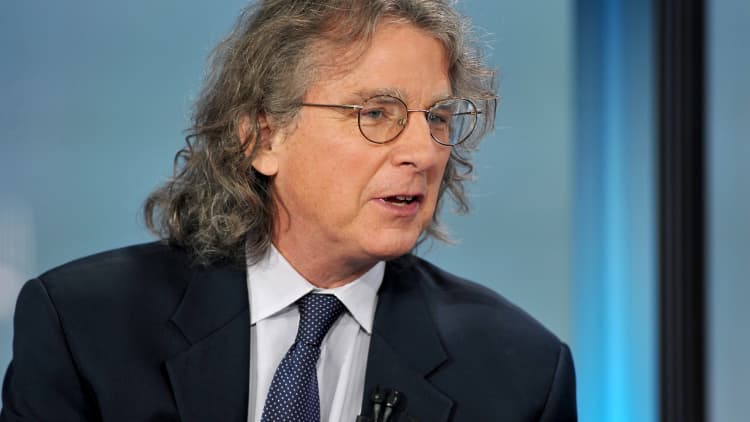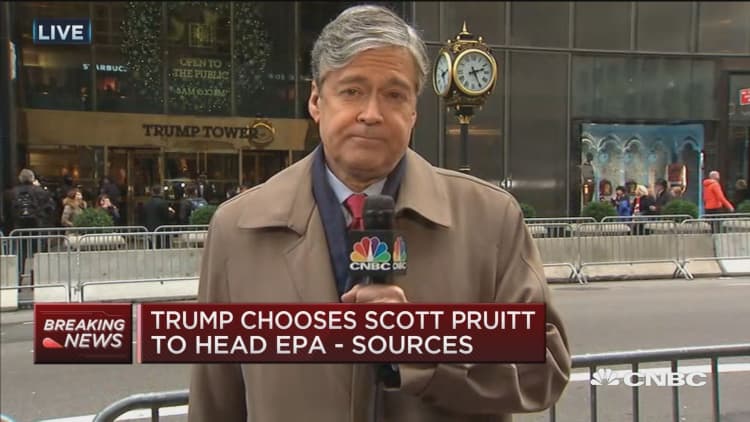
Technology investment firm Charles River Ventures took a bold step during the presidential election, welcoming visitors to its website with an unmistakable message. "[EXPLETIVE] TRUMP."
Known for early bets on Twitter, Yammer and HubSpot, CRV said in an accompanying blog post that as a firm of nine partners from seven countries speaking eight languages, it rejected Trump's anti-immigration rhetoric as "diametrically opposed to the core values of entrepreneurship."
CRV added that it would cover the costs for U.S. visas for any portfolio company founders, and the firm created a fellowship program to provide money and office space for immigrant entrepreneurs.
That was August.
Less than three months later, Trump became president-elect. In the five weeks since the election, CRV and most of Silicon Valley have been asking the question: What now?
"There are still a lot of people who are really upset," said Saar Gur, a partner at CRV in Menlo Park, California. "We haven't as a group come up with any particular action plan. We're having lots of conversation mostly at the individual level."

Across the tech universe, executives, entrepreneurs and investors are figuring out what happens next after a contentious, often hostile, campaign during which employees from internet companies contributed 100 times more money to Democratic nominee Hillary Clinton than to Trump.
Some techies are raising cash for causes deemed at-risk in a Trump administration. Others are promising to loudly resist. And there's plenty of soul-searching taking place, whether as individuals or teams, to adjust to a new and unexpected reality.
"Emotions at all of our companies were raw and elevated, regardless of political preferences," said Ryan Caldbeck, CEO of crowdfunding start-up CircleUp in San Francisco. Caldbeck said that immediately after the election, he sent a pick-me-up e-mail to his employees and was part of a group of CEOs that shared internal memos with each other.
"Many of us were struggling to find the right approach to find empathy and consolation without isolating anyone who supported the outcome," he said.
Top leaders from Apple, Alphabet, Amazon.com, Facebook, Microsoft, Cisco, Oracle and Intel are heading to New York on Wednesday for a meeting with the president-elect in Trump Tower. Those companies are all likely to benefit from a Trump presidency, due to the promise of lower taxes, less regulation and a repatriation holiday for the hundreds of billions of dollars stashed overseas. The official agenda for the Wednesday meeting will be U.S. job creation, a Trump source told CNBC.
Resist this. Not normal or acceptable.
Yet, they're also all big employers of immigrants and heavily reliant on international trade, two issues of major concern given Trump's America-first campaign narrative.
LinkedIn founder Reid Hoffman is selling humorous playing cards called Trumped Up Cards for $20.16, and donating $10 of every sale to the American Civil Liberties Union. The website describes Trumped Up Cards as "a fast-paced, satirical game where reality collides with absurdity."
Hoffman, an outspoken Trump critic, said in September that he would donate up to $5 million to veterans if Trump released his tax returns before the final debate. That, of course, never happened.
Following Trump's victory and his pick of climate change denier Scott Pruitt to run the Environmental Protection Agency, Microsoft founder Bill Gates is leading a charge to actually protect the environment.
Gates, Amazon CEO Jeff Bezos and Alibaba Executive Chairman Jack Ma from China are launching a $1 billion fund called Breakthrough Energy Ventures to finance "next generation energy technologies."
Trump has an opportunity to establish "American leadership through innovation," Gates told CNBC on Tuesday.
Chinmay Kulkarni, an assistant professor of computer science at Carnegie Mellon University, is acting at a slightly smaller scale, for now at least.
On Nov. 10, the day after Clinton conceded the election, Kulkarni took his academic research into the political realm.
As a doctoral student at Stanford University, Kulkarni had helped create a product called Talkabout, a platform that uses Google Hangouts to host group chats on a variety of targeted subjects. He utilizes the tool in his research on networked communities, analyzing how people learn in online groups.
Everybody has equal status where differences of opinion are welcomed, not challenged.Chinmay Kulkarniassistant professor at Carnegie Mellon University
Kulkarni, who grew up in India, recognized immediately after the election that Talkabout could be perfectly suited for fostering conversations between people with drastically different views, who would otherwise never interact.
The first political discussions, each involving six people, took place over Thanksgiving weekend. Kulkarni said about 50 people have used the service to talk politics with strangers.
"It is easy to say, `I'm going to talk to somebody else and try to understand them,' but without the right circumstances, you're quickly at each other's throat," Kulkarni said. "We're trying to use a lot of research on how to create productive discussions. Everybody has equal status where differences of opinion are welcomed, not challenged."
For some Silicon Valley veterans, the election result was so upsetting that it required meditation, introspection and unplugging.
Venture capitalist Kate Mitchell traveled to Japan over Thanksgiving and prayed at a Shinto shrine in Kyoto.
"I prayed for me and us to get beyond our grieving and shock and to figure out how to engage and listen to what happened and come back together," said Mitchell, a partner at Scale Venture Partners in Foster City, California.
Jodi Jahic, a partner at venture firm Aligned Partners in Menlo Park, said she went on hikes with her two young daughters in Marin County and in Arizona, "to get back to the idea that the world is bigger than any one campaign or person."
It's been a little over a month and the tech industry is clearly back to business. But nobody really knows what's in store come January.

Should Trump follow through on his promise to promote growth and make life easier for businesses, he'll likely find new and perhaps unexpected fans from San Francisco to San Jose.
But if the attitude toward immigrants is more one of deportation and alienation than acceptance, and if Trump starts punishing alternative energy producers at the expense of fossil fuels, he'll face an abundance of loud and rich opponents.
Michael Moe is one of the few Silicon Valley executives who will admit to supporting Trump.
The CEO of GSV Capital wasn't enthusiastic about his vote, but as a Republican he said he couldn't get behind Clinton. While Moe is more aligned with his industry than with Trump on issues like immigration and climate change, he's betting that the president-elect doesn't follow through on his most extreme positions, such as a ban on Muslims entering the country.
In no meaningful way does Moe expect Trump to alter tech's trajectory and its outsized significance in the global economy.
"Is he going to be an impediment to all the innovation we see out here?" Moe asked. "I don't know how he could be."
— CNBC's Josh Lipton contributed to this report.


